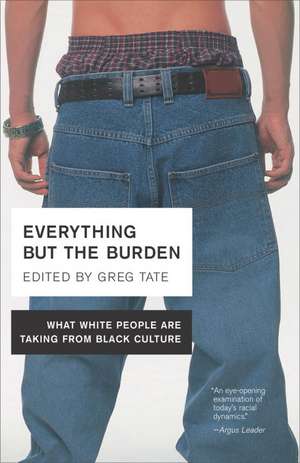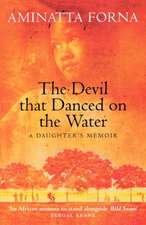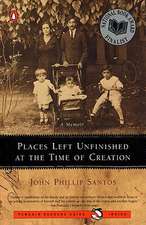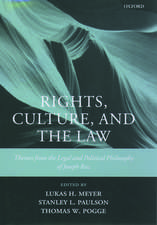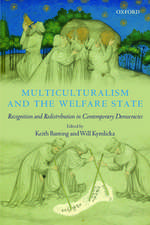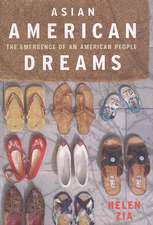Everything But the Burden: What White People Are Taking from Black Culture
Editat de Greg Tateen Limba Engleză Paperback – 31 aug 2003
Following the trail blazed by Norman Mailer’s controversial essay “The White Negro,” Everything but the Burden brings together voices from music, popular culture, the literary world, and the media speaking about how from Brooklyn to the Badlands white people are co-opting black styles of music, dance, dress, and slang. In this collection, the essayists examine how whites seem to be taking on, as editor Greg Tate’s mother used to tell him, “everything but the burden”–from fetishizing black athletes to spinning the ghetto lifestyle into a glamorous commodity. Is this a way of shaking off the fear of the unknown? A flattering indicator of appreciation? Or is it a more complicated cultural exchange? The pieces in Everything but the Burden explore the line between hero-worship and paternalism.
Among the book’s twelve essays are Vernon Reid’s “Steely Dan Understood as the Apotheosis of ‘The White Negro,’” Carl Hancock Rux’s “The Beats: America’s First ‘Wiggas,’” and Greg Tate’s own introductory essay “Nigs ’R Us.”
Other contributors include: Hilton Als, Beth Coleman, Tony Green, Robin Kelley, Arthur Jafa, Gary Dauphin, Michaela Angela Davis, dream hampton, and Manthia diAwara.
From the Hardcover edition.
Preț: 127.41 lei
Nou
Puncte Express: 191
Preț estimativ în valută:
24.38€ • 26.48$ • 20.48£
24.38€ • 26.48$ • 20.48£
Carte disponibilă
Livrare economică 02-16 aprilie
Preluare comenzi: 021 569.72.76
Specificații
ISBN-13: 9780767914970
ISBN-10: 076791497X
Pagini: 272
Dimensiuni: 138 x 220 x 17 mm
Greutate: 0.35 kg
Editura: Harlem Moon
ISBN-10: 076791497X
Pagini: 272
Dimensiuni: 138 x 220 x 17 mm
Greutate: 0.35 kg
Editura: Harlem Moon
Extras
1. Eminem: The New White Negro by Carl Hancock Rux
"Wearing visors, sunglasses
And disguises
Cause my split personality
Is having an identity crisis"
--Eminem, from "Low, Down, Dirty"
"There is a zone of non-being,
An extraordinary sterile and arid region,
An utterly naked declivity
Where an authentic upheaval can be born.
In most cases the Black man lacks the advantage
Of being able to accomplish this descent
Into a real hell."
--Frantz Fanon, from "Black Skin, White Masks"
1. Revenge of Pentheus
Pentheus, the protagonist of Euripides' The Bacchae, was a young moralist and anarchical warrior who sought to abolish the worship of Dionysus (god of tradition, or perhaps better said, god of the re-cyclical, who causes the loss of individual identity in the uncontrollable, chaotic eruption of ritualistic possession). When Pentheus sets out to infiltrate the world of the Bacchae and explore the mysteries of savage lore, his intention is to save the possessed women of Thebes (from themselves), who engage in hedonistic practices somewhere high in the mountains. Dionysus derails the young warrior's lofty mission by titillating his sexual curiosity (inviting him to take a quick glimpse of the drunken women as they revel in their lesbian orgy). In order to witness firsthand the necromancy of the inhumane, Pentheus must disguise himself as one of the inhumane. Ultimately the young moralist's disguise mirrors the appearance of Dionysus, the very god he seeks to subjugate. The transformed soldier, now possessed by the spirit of the nemesis, is set on the highest branch of a fir tree, elevated above all and visible to none--or so he is led to believe. Pentheus' disguise is as transparent as his voyeuristic fetish, and it is because of this very visible elevated space he inhabits that he is brutally dismembered by a gang of possessed women on the mountain (led by his own mother), who see him for what he is.
Historically, academics have neatly interpreted the characters of The Bacchae as belonging to themes of good versus evil, rational versus reason, nobility versus paganism. In the casual study of classical realism, Pentheus is noble in his efforts to eradicate paganism, and Dionysus is an all-powerful demonic and immoral force. But in a more careful study (or at least, an alternative one), we may learn that Dionysus is a traditional Olympian god, neither good nor bad. His powers are amoral; they are powers informed only by the powers that control human existence. Real life--death, sex, grief, joy, etc.--in its entire splendor. Dionysus and his worshipers cannot be controlled or converted. Their humanity has been perceived as inhumane, and in defense of their right to preserve an identity and a culture for themselves, an extreme cruelty befitting of inhumanity is enacted. The mother's murder of her son is a necessary evil; we accept the death of Pentheus as the inevitable defeat of his judgmental and moral idealism, but because this act of brutality is performed by the mother of its victim, we also question the value of human existence above the existence of humanity (couldn't she have just given him a slap on the hand and a good talking-to and said, "Baby, some people live differently than others, but ain't nobody better than the rest . . ."?). Perhaps the moral of the story is: The identity of the individual is most often sacrificed for the identity of the collective, so we must now all live and speak in broad familiar terms and forsake our sons and daughters for the ultimate good of humanity as we see it. The evolution of human existence is propelled by a constant narcissism; a struggle to negotiate one's perception of self and one's perception of the other, and some of the most (historically) flawed (though pervasive) acts of negotiating a collective identity are politicized oppression and cultural mimicry of the other--both of which seek agreement. Inevitably, collective agreement regarding identity produces a common design for humanity, or a morality relative to the perceptions of a particular group. Hierarchical notions of humanity are formed, and, eventually, once the tracks are laid, people will have to pitch their tents on either side. Conflict. War. Somebody (or bodies) in opposition to the populace will have to dismembered, so that new orders of identity can be formed.
Fast-forward a few thousand years to a more contemporary but parallel heroic-antiheroic protagonist--Eminem, the platinum-domed, Caesar-haircut, pop-prince bad-boy superstar of late-twentieth/early-twenty-first-century postmodern hip-hop culture. Like Pentheus, Eminem may also be seen as a rebellious and beardless icon with disdain for the majority, and like Pentheus, he dresses himself in the garments of the outcasts, has learned their language, their songs and rituals. But unlike Pentheus, Eminem is no moralist martyr with a secret desire to objectify. The real Slim Shady does not make the mistake of re-creating the Theban soldier's vain attempt to destroy the god of mass appeal. He accepts the unholy ghost as his personal savior, and with a slight flip of the Greek tragedy script (with hip-hop flare), introduces to us his first sacrifice--his own mother, whom he publicly debases and strips of all garments of integrity, drags nude into the spotlight, and ritualistically murders hit single after hit single. Though savagery is expected to call for misogyny of magnanimous proportions, Eminem's humiliation of the maternal figure is not just limited to his own mother, but extends itself to she who is also the mother of his own child (or in ghetto fabulous vernacular, his baby mama). In one of his first award-winning acts of hit-single hedonism, the real Slim Shady murders his baby mama right in front of his baby (for our entertainment and pleasure)--and later, in his sophomore phase, morphs into a fan of himself who is inspired to do the same. A continuum, thereby raising the inhumane status of outcast culture to new bacchanalian heights.
The postmodern pop-culture icon of the outlaw is complete and to be carried into the new millennium; Eminem does not seek to know pagan lore--he was born into it, has always spoken the language of it, has always danced to the music of it, has always dressed himself in the latest pagan wear, has never used this language, this music, or this apparel to disguise his true identity or to disguise his race, and he has never tried to dissociate himself from the source of his performance, the black male outlaw or outcast of hip-hop fame. Rappers Big Boi and Dre may go by the moniker Outkast, but Eminem proves that a real outcast has got to do more than make Miss Jackson's daughter cry--you got to fuck the bitch, kill the bitch, dump the bitch's dead body in the river, and not apologize for any of it.
Eminem's politically incorrect vaudeville routine (an oxymoron) is not to be attempted by everyone. Even his proteges, D-12, failed miserably as horror rappers on their debut album Devil's Night (if poor record sales and bad reviews are any indication). With boasts of slapping around handicapped women, gorging pills, and sodomizing their grandmothers, the effect is less tongue-in-cheek than tongue-in-toilet. And, when old-school mack daddy of hip-hop cool, Slick Rick, made a cameo appearance on the recently released Morcheeba album, Charango, derivatively flowing a la Eminem style ("Women Lose Weight") about murdering his overweight wife in order to hook up with his sexy blond secretary, MTV did not come-a-calling. The result is derivative at best. Incidentally, not long after the Morcheeba album release, Slick Rick found himself arrested by the INS and awaiting deportation from this country (because somebody just found out that he has been an illegal citizen for over thirty years.) Not to suggest that his penal consequences are the direct result of imitating Eminem, but so far, only Eminem gets away with being Eminem, perhaps because because he uses his disguise to disguise himself as undisguised--raising the questions, who is the real outcast, who is the real Slim Shady, what has he inherited from culture to achieve his bad-boy, outcast minstrel, rebel superstar icon, and what exactly is being performed?
2. Fanon Had a (Semantic) Dream
Frantz Fanon tells us that the oppressed must identify an oppressive archetype in order to overcome historical oppression. But before the oppressed can achieve acts of true upheaval, they must first realize that they have yet to achieve "non-being" status. The oppressed may have attempted prior acts of resistance, but have never actually "descended into a real hell" that will scorch into the very nature of seeing an effective upheaval that brings the non-being into being. For now, the oppressed continue to live in the dream of identity, the dream that (in reality) the oppressed are, in fact, Negro, Colored, Black, Minority, Afro or African American, Hispanic, Oriental, Dykes, Queers, Bitches, Hos, Niggaz. All accepted as real identities. The acceptance of these identities further compels a performance of these identities, whether compliant or rebellious.
The oppressed identity performance relies upon a collective agreement informed by a historical narrative that either supports the validity of, or opposes the construct of, these identities. Before a revisionist identity can be forged, there was an inheritance and an acceptance of a construct--thus, even when the oppressed think they are revising their identities, updating the language of their identities, or endeavoring to better the circumstances of their identities, they are not--not completely and not actually--because no language in the American polyglot has ever been subscribed to by the collective that points to the very nature of human identity beyond elementary categorizations, and no accurate language identity exists in our collective agreement. We are comfortable with vague concepts of identity, and the ghettos and empires these concepts create.
What the oppressed figure in America has been working with as an identity is actually an archetypal construct born out of a dream (as in aspirations and imaginings) belonging to an oppressive figure who is not only the architect of the dream that oppresses us, but is also the Dionysian-like landlord of our realities--both good and bad--neither real nor unreal, and completely exempt from being vanquished from our realities. We inhabit an oppressive dream, and until that descent into Fanon's "real hell," the oppressed will continue to pay a high price to rent substandard space in the dream that we call race in America.
3. Eminem, the Other White Meat
". . . If all the Niggers
Started calling eachother Nigger,
Not only among themselves . . . but among Ofays . . .
Nigger wouldn't mean anymore than 'Good night,'
'God bless you,' or 'I promise to tell the whole truth
And nothing but the whole truth so help me God' . . .
When that beautiful day comes,
You'll never see another Nigger kid
Come home from school crying
Because some Ofay motherfucker called him Nigger."
--Lenny Bruce
Eminem, a.k.a. Marshall Mathers, was born in St. Joseph, Missouri (near Kansas City), spending the better part of his impoverished childhood in Detroit, Michigan--which, by the way, is about 90 percent ethnic minority and has one of the highest concentrations of African Americans in the nation, at 83 percent, while non-Latino whites comprise only 12 percent of the city's population. Detroit's recent dip below one million is largely attributed to continuing white flight, and 10 percent of the state's population has lived in poverty for more than twenty years (a family of three with an income of a little more than $9,300 earns too much to qualify for welfare in Michigan--but is about $4,000 below the federal poverty guideline), according to the American Community Survey released by the U.S. Census Bureau. Translation: Eminem may have been born white but he was socialized as black, in the proverbial hood--and the music of the proverbial hood in America for the last twenty-five years has been hip-hop music. The same inner-city struggles and impoverished circumstances that brought us blues, jazz, rhythm and blues, doo-wop and soul, brought us hip-hop music--it began as a form of identity-boosting vocal scatting over pulsating beats and progressed to become a means of expressing the social realities of African-American urbanity. By the time it became a major money-maker in the music industry, the genre of hip-hop transformed into a bodacious representation of gangsta life and gangsta obsessions replete with murder, money, sex, alcohol and drug consumption--and, when this got tired, narrowed itself down and preoccupied itself with the glam of capital gain.
The legend of Eminem, a.k.a. Slim Shady, a.k.a. Marshall Mathers (and his psychotic nasal slapstick trips of alienation) begins with his Detroit exposure to rap, performing it at the age of fourteen and later earning notoriety as a member of the Motor City duo Soul Intent. The legend is that he dropped out of high school, worked minimum-wage jobs, practiced beat boxing and freestyling his lyrics on home recordings, and worshiped rap groups like NWA--he admits he "wanted to be Dr. Dre and Ice Cube," wore big sunglasses while "lip-syncking to their records in the mirror." He also honed his style in the company of five black Detroit MC's (D12). Together, the racially integrated posse decided that each of them would invent an alter ego, thus the six MC's were to be thought of as twelve MC's--dubbing themselves, the Dirty Dozen. When Eminem emerged as a solo artist in 1996 with the independent release Infinite, he was accused of trying to sound "too much like Nas," so he perfected a nasal white-boy, horror-rap cadence, following Infinite with The Slim Shady LP, which led the hip-hop underground to dub him hip-hop's "great white hope."
The legend of his discovery varies. Allegedly, Dr. Dre discovered Eminem's demo tape on the floor of Interscope label chief Jimmy Iovine's garage. Another story goes that Dre first heard Eminem on the radio and said, "Find that kid whoever he is! I'm gonna make him a star!" or something like that. Either way, not until Eminem took second place (who won first?) in the freestyle category at 1997's Rap Olympics MC Battle in Los Angeles did Dre agree to sign him, producing the bestselling triple-platinum Slim Shady LP in early 1999. With controversial yet undeniable talent (the right mix for stardom of any kind), Eminem became the white-boy cartoon god of surreal white-trash humor and graphic violence, a stratum of Roseanne Barr-meets-Quentin Tarrentino-meets-Mickey Mouse Club-cum Snoop Dogg and beatnik Dobie Gillis. The Marshall Mathers LP followed and sold close to two million copies in its first week of release, making it one of the fastest-selling rap albums of all time, and his latest album, The Eminem Show, was the first album since 'N Sync's Celebrity and the September 11 terrorist attacks to sell over one million copies in its debut week. To top it all off, Eminem's roman a clef feature film debut, 8 Mile, is described as a story about "the boundaries that define our lives and a young man's struggle to find the strength and courage to transcend them." In his great struggle to transcend boundaries, the surrealist rap icon has also managed two weapons charges, an assault charge, a lawsuit from his mother for humiliating her in his lyrics, and his baby mama's attempted suicide--all to keep it real, as they say.
From the Hardcover edition.
"Wearing visors, sunglasses
And disguises
Cause my split personality
Is having an identity crisis"
--Eminem, from "Low, Down, Dirty"
"There is a zone of non-being,
An extraordinary sterile and arid region,
An utterly naked declivity
Where an authentic upheaval can be born.
In most cases the Black man lacks the advantage
Of being able to accomplish this descent
Into a real hell."
--Frantz Fanon, from "Black Skin, White Masks"
1. Revenge of Pentheus
Pentheus, the protagonist of Euripides' The Bacchae, was a young moralist and anarchical warrior who sought to abolish the worship of Dionysus (god of tradition, or perhaps better said, god of the re-cyclical, who causes the loss of individual identity in the uncontrollable, chaotic eruption of ritualistic possession). When Pentheus sets out to infiltrate the world of the Bacchae and explore the mysteries of savage lore, his intention is to save the possessed women of Thebes (from themselves), who engage in hedonistic practices somewhere high in the mountains. Dionysus derails the young warrior's lofty mission by titillating his sexual curiosity (inviting him to take a quick glimpse of the drunken women as they revel in their lesbian orgy). In order to witness firsthand the necromancy of the inhumane, Pentheus must disguise himself as one of the inhumane. Ultimately the young moralist's disguise mirrors the appearance of Dionysus, the very god he seeks to subjugate. The transformed soldier, now possessed by the spirit of the nemesis, is set on the highest branch of a fir tree, elevated above all and visible to none--or so he is led to believe. Pentheus' disguise is as transparent as his voyeuristic fetish, and it is because of this very visible elevated space he inhabits that he is brutally dismembered by a gang of possessed women on the mountain (led by his own mother), who see him for what he is.
Historically, academics have neatly interpreted the characters of The Bacchae as belonging to themes of good versus evil, rational versus reason, nobility versus paganism. In the casual study of classical realism, Pentheus is noble in his efforts to eradicate paganism, and Dionysus is an all-powerful demonic and immoral force. But in a more careful study (or at least, an alternative one), we may learn that Dionysus is a traditional Olympian god, neither good nor bad. His powers are amoral; they are powers informed only by the powers that control human existence. Real life--death, sex, grief, joy, etc.--in its entire splendor. Dionysus and his worshipers cannot be controlled or converted. Their humanity has been perceived as inhumane, and in defense of their right to preserve an identity and a culture for themselves, an extreme cruelty befitting of inhumanity is enacted. The mother's murder of her son is a necessary evil; we accept the death of Pentheus as the inevitable defeat of his judgmental and moral idealism, but because this act of brutality is performed by the mother of its victim, we also question the value of human existence above the existence of humanity (couldn't she have just given him a slap on the hand and a good talking-to and said, "Baby, some people live differently than others, but ain't nobody better than the rest . . ."?). Perhaps the moral of the story is: The identity of the individual is most often sacrificed for the identity of the collective, so we must now all live and speak in broad familiar terms and forsake our sons and daughters for the ultimate good of humanity as we see it. The evolution of human existence is propelled by a constant narcissism; a struggle to negotiate one's perception of self and one's perception of the other, and some of the most (historically) flawed (though pervasive) acts of negotiating a collective identity are politicized oppression and cultural mimicry of the other--both of which seek agreement. Inevitably, collective agreement regarding identity produces a common design for humanity, or a morality relative to the perceptions of a particular group. Hierarchical notions of humanity are formed, and, eventually, once the tracks are laid, people will have to pitch their tents on either side. Conflict. War. Somebody (or bodies) in opposition to the populace will have to dismembered, so that new orders of identity can be formed.
Fast-forward a few thousand years to a more contemporary but parallel heroic-antiheroic protagonist--Eminem, the platinum-domed, Caesar-haircut, pop-prince bad-boy superstar of late-twentieth/early-twenty-first-century postmodern hip-hop culture. Like Pentheus, Eminem may also be seen as a rebellious and beardless icon with disdain for the majority, and like Pentheus, he dresses himself in the garments of the outcasts, has learned their language, their songs and rituals. But unlike Pentheus, Eminem is no moralist martyr with a secret desire to objectify. The real Slim Shady does not make the mistake of re-creating the Theban soldier's vain attempt to destroy the god of mass appeal. He accepts the unholy ghost as his personal savior, and with a slight flip of the Greek tragedy script (with hip-hop flare), introduces to us his first sacrifice--his own mother, whom he publicly debases and strips of all garments of integrity, drags nude into the spotlight, and ritualistically murders hit single after hit single. Though savagery is expected to call for misogyny of magnanimous proportions, Eminem's humiliation of the maternal figure is not just limited to his own mother, but extends itself to she who is also the mother of his own child (or in ghetto fabulous vernacular, his baby mama). In one of his first award-winning acts of hit-single hedonism, the real Slim Shady murders his baby mama right in front of his baby (for our entertainment and pleasure)--and later, in his sophomore phase, morphs into a fan of himself who is inspired to do the same. A continuum, thereby raising the inhumane status of outcast culture to new bacchanalian heights.
The postmodern pop-culture icon of the outlaw is complete and to be carried into the new millennium; Eminem does not seek to know pagan lore--he was born into it, has always spoken the language of it, has always danced to the music of it, has always dressed himself in the latest pagan wear, has never used this language, this music, or this apparel to disguise his true identity or to disguise his race, and he has never tried to dissociate himself from the source of his performance, the black male outlaw or outcast of hip-hop fame. Rappers Big Boi and Dre may go by the moniker Outkast, but Eminem proves that a real outcast has got to do more than make Miss Jackson's daughter cry--you got to fuck the bitch, kill the bitch, dump the bitch's dead body in the river, and not apologize for any of it.
Eminem's politically incorrect vaudeville routine (an oxymoron) is not to be attempted by everyone. Even his proteges, D-12, failed miserably as horror rappers on their debut album Devil's Night (if poor record sales and bad reviews are any indication). With boasts of slapping around handicapped women, gorging pills, and sodomizing their grandmothers, the effect is less tongue-in-cheek than tongue-in-toilet. And, when old-school mack daddy of hip-hop cool, Slick Rick, made a cameo appearance on the recently released Morcheeba album, Charango, derivatively flowing a la Eminem style ("Women Lose Weight") about murdering his overweight wife in order to hook up with his sexy blond secretary, MTV did not come-a-calling. The result is derivative at best. Incidentally, not long after the Morcheeba album release, Slick Rick found himself arrested by the INS and awaiting deportation from this country (because somebody just found out that he has been an illegal citizen for over thirty years.) Not to suggest that his penal consequences are the direct result of imitating Eminem, but so far, only Eminem gets away with being Eminem, perhaps because because he uses his disguise to disguise himself as undisguised--raising the questions, who is the real outcast, who is the real Slim Shady, what has he inherited from culture to achieve his bad-boy, outcast minstrel, rebel superstar icon, and what exactly is being performed?
2. Fanon Had a (Semantic) Dream
Frantz Fanon tells us that the oppressed must identify an oppressive archetype in order to overcome historical oppression. But before the oppressed can achieve acts of true upheaval, they must first realize that they have yet to achieve "non-being" status. The oppressed may have attempted prior acts of resistance, but have never actually "descended into a real hell" that will scorch into the very nature of seeing an effective upheaval that brings the non-being into being. For now, the oppressed continue to live in the dream of identity, the dream that (in reality) the oppressed are, in fact, Negro, Colored, Black, Minority, Afro or African American, Hispanic, Oriental, Dykes, Queers, Bitches, Hos, Niggaz. All accepted as real identities. The acceptance of these identities further compels a performance of these identities, whether compliant or rebellious.
The oppressed identity performance relies upon a collective agreement informed by a historical narrative that either supports the validity of, or opposes the construct of, these identities. Before a revisionist identity can be forged, there was an inheritance and an acceptance of a construct--thus, even when the oppressed think they are revising their identities, updating the language of their identities, or endeavoring to better the circumstances of their identities, they are not--not completely and not actually--because no language in the American polyglot has ever been subscribed to by the collective that points to the very nature of human identity beyond elementary categorizations, and no accurate language identity exists in our collective agreement. We are comfortable with vague concepts of identity, and the ghettos and empires these concepts create.
What the oppressed figure in America has been working with as an identity is actually an archetypal construct born out of a dream (as in aspirations and imaginings) belonging to an oppressive figure who is not only the architect of the dream that oppresses us, but is also the Dionysian-like landlord of our realities--both good and bad--neither real nor unreal, and completely exempt from being vanquished from our realities. We inhabit an oppressive dream, and until that descent into Fanon's "real hell," the oppressed will continue to pay a high price to rent substandard space in the dream that we call race in America.
3. Eminem, the Other White Meat
". . . If all the Niggers
Started calling eachother Nigger,
Not only among themselves . . . but among Ofays . . .
Nigger wouldn't mean anymore than 'Good night,'
'God bless you,' or 'I promise to tell the whole truth
And nothing but the whole truth so help me God' . . .
When that beautiful day comes,
You'll never see another Nigger kid
Come home from school crying
Because some Ofay motherfucker called him Nigger."
--Lenny Bruce
Eminem, a.k.a. Marshall Mathers, was born in St. Joseph, Missouri (near Kansas City), spending the better part of his impoverished childhood in Detroit, Michigan--which, by the way, is about 90 percent ethnic minority and has one of the highest concentrations of African Americans in the nation, at 83 percent, while non-Latino whites comprise only 12 percent of the city's population. Detroit's recent dip below one million is largely attributed to continuing white flight, and 10 percent of the state's population has lived in poverty for more than twenty years (a family of three with an income of a little more than $9,300 earns too much to qualify for welfare in Michigan--but is about $4,000 below the federal poverty guideline), according to the American Community Survey released by the U.S. Census Bureau. Translation: Eminem may have been born white but he was socialized as black, in the proverbial hood--and the music of the proverbial hood in America for the last twenty-five years has been hip-hop music. The same inner-city struggles and impoverished circumstances that brought us blues, jazz, rhythm and blues, doo-wop and soul, brought us hip-hop music--it began as a form of identity-boosting vocal scatting over pulsating beats and progressed to become a means of expressing the social realities of African-American urbanity. By the time it became a major money-maker in the music industry, the genre of hip-hop transformed into a bodacious representation of gangsta life and gangsta obsessions replete with murder, money, sex, alcohol and drug consumption--and, when this got tired, narrowed itself down and preoccupied itself with the glam of capital gain.
The legend of Eminem, a.k.a. Slim Shady, a.k.a. Marshall Mathers (and his psychotic nasal slapstick trips of alienation) begins with his Detroit exposure to rap, performing it at the age of fourteen and later earning notoriety as a member of the Motor City duo Soul Intent. The legend is that he dropped out of high school, worked minimum-wage jobs, practiced beat boxing and freestyling his lyrics on home recordings, and worshiped rap groups like NWA--he admits he "wanted to be Dr. Dre and Ice Cube," wore big sunglasses while "lip-syncking to their records in the mirror." He also honed his style in the company of five black Detroit MC's (D12). Together, the racially integrated posse decided that each of them would invent an alter ego, thus the six MC's were to be thought of as twelve MC's--dubbing themselves, the Dirty Dozen. When Eminem emerged as a solo artist in 1996 with the independent release Infinite, he was accused of trying to sound "too much like Nas," so he perfected a nasal white-boy, horror-rap cadence, following Infinite with The Slim Shady LP, which led the hip-hop underground to dub him hip-hop's "great white hope."
The legend of his discovery varies. Allegedly, Dr. Dre discovered Eminem's demo tape on the floor of Interscope label chief Jimmy Iovine's garage. Another story goes that Dre first heard Eminem on the radio and said, "Find that kid whoever he is! I'm gonna make him a star!" or something like that. Either way, not until Eminem took second place (who won first?) in the freestyle category at 1997's Rap Olympics MC Battle in Los Angeles did Dre agree to sign him, producing the bestselling triple-platinum Slim Shady LP in early 1999. With controversial yet undeniable talent (the right mix for stardom of any kind), Eminem became the white-boy cartoon god of surreal white-trash humor and graphic violence, a stratum of Roseanne Barr-meets-Quentin Tarrentino-meets-Mickey Mouse Club-cum Snoop Dogg and beatnik Dobie Gillis. The Marshall Mathers LP followed and sold close to two million copies in its first week of release, making it one of the fastest-selling rap albums of all time, and his latest album, The Eminem Show, was the first album since 'N Sync's Celebrity and the September 11 terrorist attacks to sell over one million copies in its debut week. To top it all off, Eminem's roman a clef feature film debut, 8 Mile, is described as a story about "the boundaries that define our lives and a young man's struggle to find the strength and courage to transcend them." In his great struggle to transcend boundaries, the surrealist rap icon has also managed two weapons charges, an assault charge, a lawsuit from his mother for humiliating her in his lyrics, and his baby mama's attempted suicide--all to keep it real, as they say.
From the Hardcover edition.
Notă biografică
A cultural critic for The Village Voice, GREG TATE is also the author of Flyboy in the Buttermilk and contributes regularly to national publications such as Rolling Stone, VIBE, and the New York Times. In addition, he helped found the Black Rock Coalition, produced two albums on his own label, and composed a libretto that was performed at the Apollo Theater. He lives in New York City.
From the Hardcover edition.
From the Hardcover edition.
Recenzii
"For some reason or maybe for none I put Marvin Gaye's What's Going On in my car CD and took myself back to the Sixties and projected myself with that same music on up to Mars. Whatever else Black Americans may be we have defined the past. It is our experience with capture, enslavement, emancipation, segregation, and redemption that will celebrate this living and save our souls. We will define the future. It is our willingness to forgive that both perplexes and confounds those who think they can braid their hair or drop their pants and know something about the splendor of being who we are. EVERYTHING BUT THE BURDEN looks through both a telescope and a mirror. The images reflect and rebound. Sure they will take Gaye's anguish and make a commercial out of it for Radio Shack just like they took So You Want a Revolution to tell you to buy Nikes. But we're still here, still laughing, still loving, still deciding what looks good and what sounds right. We're still hugging ourselves, still making joyful noise. Still finding a way to be human and humane. It is not, after all, the blackness that has caused our loss of vision making us turn and turn in this tunnel of despair; it is the blackness that is showing us a way out."
-Nikki Giovanni, Poet
"While whites have long been ripping off black culture, there is something new under the sun. Greg Tate has put together an impressive collection of essays, an interview and even poetry that puts its collective finger on the new white piracy. A must read for anyone interested in the intersection of race and contemporary American culture."
-Dalton Conley, author of HONKY
From the Hardcover edition.
-Nikki Giovanni, Poet
"While whites have long been ripping off black culture, there is something new under the sun. Greg Tate has put together an impressive collection of essays, an interview and even poetry that puts its collective finger on the new white piracy. A must read for anyone interested in the intersection of race and contemporary American culture."
-Dalton Conley, author of HONKY
From the Hardcover edition.
